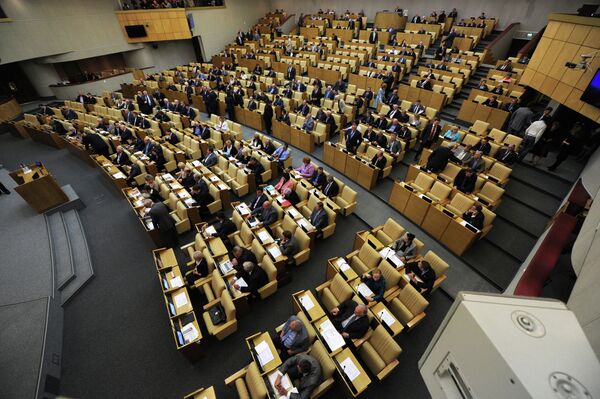MOSCOW, January 10 (RIA Novosti) – A grassroots petition to disband the lower chamber of the Russian parliament, the State Duma, gathered on Thursday the 100,000 signatures required for the Duma to review it.
But ruling party officials said they have no intention to follow through on the proposal, even though President Vladimir Putin personally urged them earlier to consider all such petitions.
The online petition was launched by the oppositional Novaya Gazeta in late December, when the Duma passed the controversial bill banning adoptions of Russian children by Americans.
As of Thursday afternoon, the petition had more than 109,000 signatures. The signature collection is set to go on until Feb. 1.
The Duma will consider the proposal, but is not expected to act on it because doing so would run counter to the Constitution, Vladimir Pligin, a lawmaker with the ruling United Russia and the head of the Duma’s Constitution and State Affairs Committee, said on Thursday.
Moreover, disbandment would mean ignoring the 60 million people who voted in the 2011 Duma elections, said Deputy Speaker Sergei Neverov, also of United Russia.
The last Duma elections were widely questioned, with critics alleging that between 10 and 20 percent of the votes were rigged to ensure that United Russia retains a slim majority in the parliament. The vote triggered the mass protests in Moscow that were ongoing throughout 2012.
Putin said in December that the Duma should be required to consider all grassroots petitions that gathered 100,000 or more signatures.
However, the lower chamber already ignored the 130,000 signatures in protest of the anti-adoption ban that were filed with it ahead of the bill’s third reading in December.
The Duma has no legal mechanisms to consider such petitions, Pligin told Izvestia daily for a story published on Thursday, adding that his committee is drafting a bill to remedy that.
United Russia legislators promised in December to “review” the petition against the anti-adoption legislation after the parliamentary rules are changed to allow such reviews. It remained unclear whether that implied possible repeal or revision of the already enacted law.


